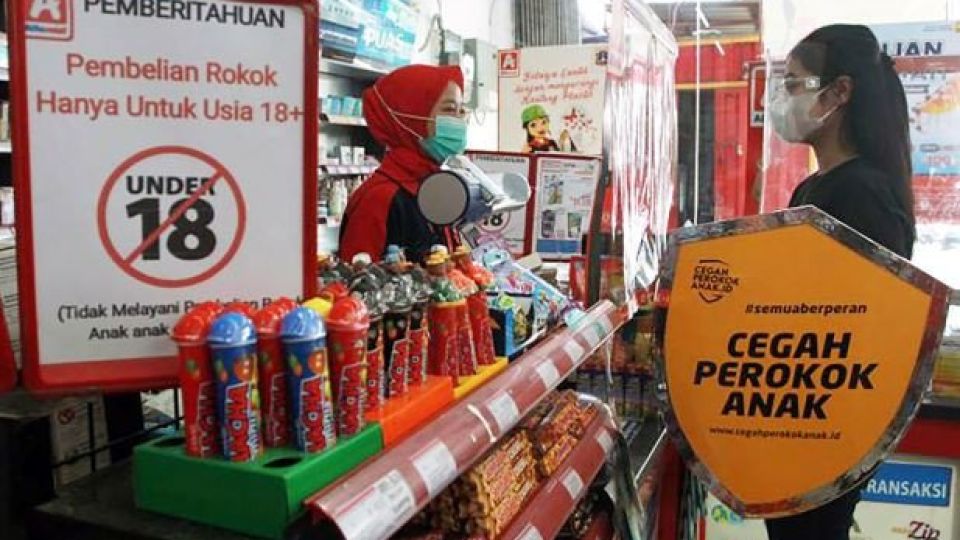May 25, 2023
JAKARTA – Health activists are unhappy with the proposed tobacco rules in the omnibus bill on health because it fails to provide stricter tobacco control for the country.
Iman Mahaputra Zein, coordinator for the tobacco control campaign at the Center for Indonesia Strategic Development Initiatives (CISDI), said tobacco control regulations in the new health bill, currently being deliberated at the House of Representatives, remained relatively lax.
“For example, the new health bill has failed to ban the advertising, sponsorship and promotion of tobacco products. It also stipulates a special rule for the distribution of tobacco products used for medical treatments, cosmetics and aromatherapy. We fear that this bill will be abused by the tobacco industry,” he told The Jakarta Post on Sunday.
Indonesia is the only country in the Southeast Asia region that still allows cigarette advertising in television and printed media. According to the World Health Organization, in 2021 some 144 countries in the world had totally banned the advertising, sponsorship and promotion of tobacco products in mass media and at point-of-sale.
Antitobacco proponents have blamed the lax regulation in cigarette advertising as the main contributor to the increasing number of child smokers in the country.
In 2016 the prevalence of cigarette smokers under the age of 18 was 8.8 percent. The rate increased to 9.1 in 2018 and to 10.7 in 2019. Statistics Indonesia predicts that this figure could reach 16 percent by 2030 if the government does not implement a serious intervention to reduce tobacco consumption.
A 2022 study by the Indonesia Institute for Social Development (IISD) and the Muhammadiyah Student Association (IPM) revealed that 93.6 percent of Indonesian students were exposed to cigarette advertisements and 71 percent of student smokers said that tobacco ads inspired them to try smoking.
Another study has also shown that children between the ages of 13 and 18 who are exposed to cigarette advertising are 2.7 times more likely to start smoking compared with those who are not.
Read also: Govt seeks to tighten tobacco controls in bid to stub out underage smoking
IISD program director Ahmad Fanani pointed out that some proposed tobacco provisions were actually a step back in the country’s efforts to curb smoking.
“Article 157 of the bill stipulates that office buildings and public places located in smoke-free zones are required to provide smoking areas. It will be difficult to ensure the ambient air in the smoking-free zones remains clean when there are designated smoking areas inside it,” he said as quoted by tempo.co.
Farmers, industry demands
While the health bill has left health groups yearning for stricter regulation, the tobacco industry and its supporters have said that the bill might negatively impact the industry and farmers.
The Cigarette Producers Association (Gappri) has recently sent a letter to President Joko “Jokowi” Widodo asking him to scrap all tobacco regulations in the bill, arguing that they would create a multiplier effect and greatly disrupt the tobacco industry if passed.
The largest Muslim organization in Indonesia, the Nahdhatul Ulama (NU), along with the tobacco farmers association and some lawmakers have also opposed the proposed tobacco rules, particularly the provision that classifies tobacco as an addictive substance along with alcohol and narcotics.
The NU’s bahtsul masa’il (forum for religious problems) head Mahbub Ma’afi said the provision could risk criminalizing tobacco farmers in various regions and threaten their livelihood.
“[The new regulation makes it seems] like tobacco farmers will be classified as people who plant narcotics or marijuana,” he said recently. “If the regulation is passed, it may risk criminalizing farmers.”
Read also: Low income families’ tobacco indulgence hurts essential needs spending, study finds
Health Ministry spokesperson Siti Nadia Tarmidzi said categorizing tobacco as an addictive substance along with narcotics and alcohol was in line with the WHO guidelines.
“It’s not something new. The prevailing 2009 Health Law already categorized tobacco as an addictive substance,” Nadia told the Post on Tuesday.
She added that categorizing tobacco as an addictive substance along with narcotics did not mean that tobacco distribution would be treated the same as drug trafficking, which carries severe punishments in Indonesian law.
The ministry has been seeking to implement stricter tobacco controls by revising the prevailing 2012 government regulation on the restriction of addictive tobacco substances for health since 2018, but the progress remains sluggish, mainly due to resistance from industry players.
Indonesia is one of only seven nations around the globe that is yet to ratify the WHO’s Framework Convention on Tobacco Control (FCTC).
According to data from the Health Ministry, tobacco kills around 290,000 people each year, and in 2017 the economic burden of smoking in the country amounted to Rp 531.8 trillion (US$35.6 billion), roughly 3.6 times greater than the tobacco excise revenue that year.


